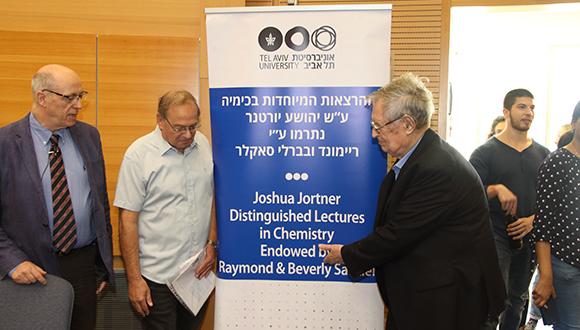Joshua Jortner Distinguished Lectures in Chemistry - Much Ado about Knotting
Prof. David Leigh, Manchester University
Abstract:
In recent years, examples of synthetic molecular machines and motors1 have been developed,2 all be they primitive by biological standards. Such molecules are best designed to work through statistical mechanisms. In a manner reminiscent of Maxwell’s Demon3 random thermal motion is rectified through ratchet mechanisms,3-7 giving chemistry direction.
It is increasingly being recognised that similar concepts can be applied to other chemical exchange processes.8 Ratchet mechanisms - effectively chemical engines9 in which catalysis4,6,7 of ‘fuel’ to ‘waste’ is used to drive another chemical process - cause directional impetus in what are otherwise stochastic systems, including reversible chemical reactions. This is ushering in a new era of non-equilibrium chemistry, providing fundamental advances in functional molecule design, overturning existing dogma and offering fresh insights into biology and molecular nanotechnology.
[1] The Nobel Prize in Chemistry 2016–Advanced Information. Nobelprize.org. Nobel Media AB 2014. Web. 6 Oct, 2016, http://www.nobelprize.org/nobel_prizes/chemistry/laureates/2016/advanced.... [2] "Rise of the molecular machines", Angew. Chem. Int. Ed. 54, 10080 (2015). [3] "A molecular information ratchet", Nature 445, 523 (2007). [4] "An autonomous chemically fuelled small-molecule motor", Nature 534, 235 (2016). [5] "Rotary and linear molecular motors driven by pulses of a chemical fuel", Science 358, 340 (2017). [6] "A catalysis-driven artificial molecular pump", Nature 594, 529 (2021). [7] "Autonomous fuelled directional rotation about a covalent single bond", Nature 604, 80 (2022). [8] "Design, synthesis and operation of small molecules that walk along tracks", J. Am. Chem. Soc. 132, 16134 (2010). [9] "Chemical engines: Driving systems away from equilibrium through catalyst reaction cycles", Nat. Nanotechnol. 16, 1057 (2021).
מארגן האירוע: ד"ר רומן דוברובצקי


